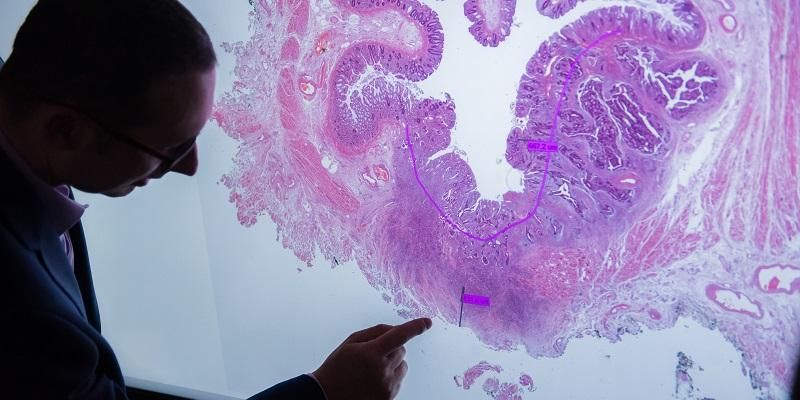
Bowel cancer patients in Yorkshire will continue to benefit from improvements in diagnosis and treatment following a £2.1 million funding boost from Yorkshire Cancer Research.
The charity’s Bowel Cancer Improvement Programme – led by the University – will be extended for a further five years so researchers can continue to work towards their goal of bringing gold-standard care to every part of the region.
“Our vision is to improve treatment for people with bowel cancer and ensure more people survive.”
Every year more than 3,000 people are diagnosed with bowel cancer in Yorkshire. Although survival rates are improving, four in 10 patients will die within five years of being diagnosed.
Since 2015, researchers funded by Yorkshire Cancer Research have been analysing data from hospitals in the region, identifying areas of improvement and working with healthcare professionals from a wide variety of medical disciplines to implement changes in practice.
The following video explains more about the Yorkshire Cancer Research Bowel Cancer Improvement Programme:
Philip Quirke, Professor of Pathology at the University of Leeds’ School of Medicine, leads the study.
He said: “There is currently a postcode lottery in terms of treatment for bowel cancer. Our vision is to improve treatment for people with bowel cancer and ensure more of them survive.
"We want to offer the latest medical advances and make Yorkshire the best place for managing patients with bowel cancer. We also want to make Yorkshire the best place to do bowel cancer research so people in Yorkshire can benefit first.”
Learning from other countries
As well as working to address variations in treatment across the region, the research team has looked to Denmark to find ways of improving healthcare standards. Denmark has a similar sized population to Yorkshire, but survival rates are higher. In Yorkshire, seven in 10 people survive for at least two years after a bowel cancer diagnosis, compared to eight in 10 in Denmark.
By achieving the same standards as Denmark, up to 300 lives could be saved in Yorkshire each year.
Professor Quirke said: “In Denmark, improvement programmes were adopted in a very systematic fashion and they have been generating very improved outcomes. We’re trying to introduce those measures in Yorkshire so we can try to improve our outcomes to the same level.”
Work carried out by the Bowel Cancer Improvement Programme has already improved the processes that clinicians across Yorkshire use to treat patients in areas such as advanced disease and radiotherapy. The team has also improved the checking of patients for potential adverse reactions to treatment, so doctors can avoid giving treatments to those who are likely to suffer severe side effects.
In addition, the team has investigated the quality and consistency of radiology in Yorkshire and provided training to improve the quality of magnetic resonance imaging (MRI) for rectal cancer. In surgery, the team has shared key data with multi-disciplinary teams and made improvements in abdominoperineal excision, which is an operation to remove the rectum and anal canal.
The programme has also helped to introduce screening for inherited genetic conditions which increase the risk of developing bowel cancer, including Lynch syndrome.
'Holistic approach to diagnosis and treatment'
The funding provided by Yorkshire Cancer Research has helped attract further investment of more than £10 million from other charities and organisations, which is being used to bring the latest science to Yorkshire.
Dr Kathryn Scott, Chief Executive at Yorkshire Cancer Research, said: “This is about taking a holistic approach to bowel cancer diagnosis and treatment in our region. It is essential that hospitals in Yorkshire are able to learn from each other and adopt the most successful ways of working so that areas for improvement can be identified and the necessary changes implemented.
“By creating a clear picture of bowel cancer treatment in Yorkshire, bringing together experts from all points in a patient’s journey and taking action to tackle local problems, we can ensure all patients receive gold standard care, irrespective of where they live and where they are treated."
Further information
- Top image: Yorkshire Cancer Research.
- For media enquiries, please contact David Lewis in the University's press office via d.lewis@leeds.ac.uk.